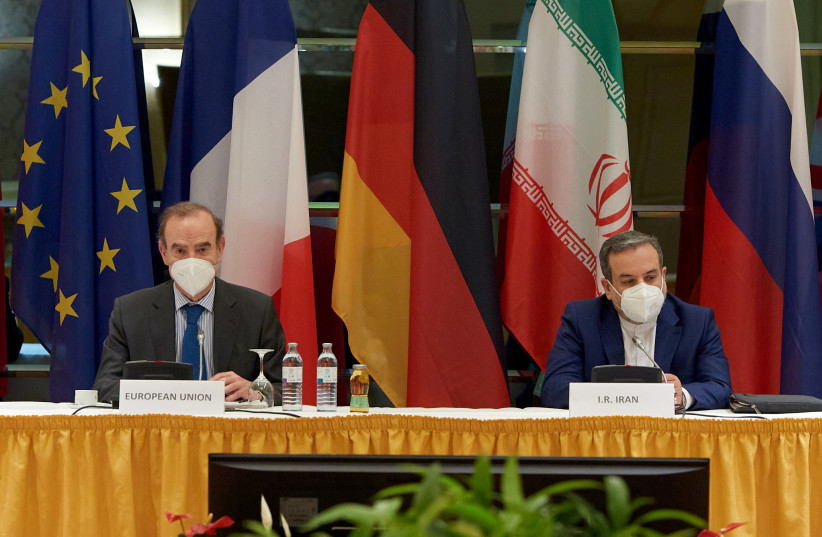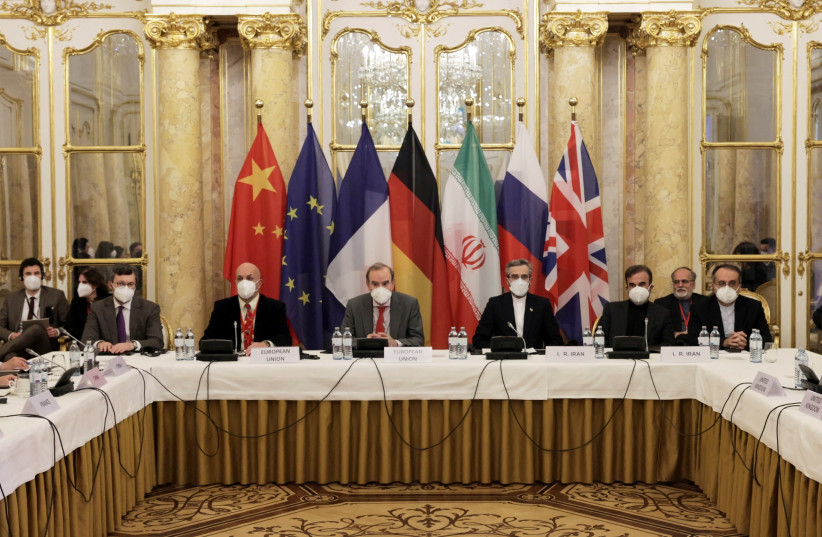by Eric R. Mandel
Israel and a bipartisan consensus of Congress and the American people wanted a nuclear deal that ultimately ended Iran’s nuclear weapon program forever.
 |
European External Action Service (EEAS) Deputy
Secretary General Enrique Mora and Iranian Deputy at Ministry of Foreign
Affairs Abbas Araghchi wait for the start of a meeting of the JCPOA
Joint Commission in Vienna, Austria May 1, 2021.
(photo credit: EU DELEGATION IN VIENNA/HANDOUT VIA REUTERS)
|
As we approach the possibility of a new Iran nuclear agreement without Congressional oversight, the partisan and personal vitriol that surrounded the 2015 Joint Comprehensive Plan of Action (JCPOA) is stirred up again, creating the danger that an important decision may be clouded by political allegiance, spite, pride, and fatigue.
The divide within the American politic, Republican vs Democratic, is straightforward. The divide within Israel is not only about the merits or dangers of a nuclear agreement but about how its prime minister handled Israel’s dissent, going to Congress in 2014 and being blamed for exacerbating the US political divide in support of Israel.
Unfortunately, those divisions have also brought some to resort to fabrications. Just what the Iranian negotiators need – bickering and confusion on the other side of the table.
So when I read a column by former Israeli consul-general Alon Pincus in Haaretz, saying, “Israel’s decade-long opposition to any agreement with Iran over its nuclear program is well documented. Any idea, any framework, any premise ever considered.” I paused, reread it, and pondered how dangerous such a distortion is for the US-Israel relationship.
The claim that Israel did not want any deal with Iran is preposterous. Israel and a bipartisan consensus of Congress and the American people wanted a nuclear deal that ultimately ended Iran’s nuclear weapon program forever.

Former president Barack Obama said the “deal we’ll accept is they end their nuclear program… No deal is better than a bad deal.” Unfortunately, he talked that talk, but he didn’t walk that walk. To get a deal done, he and his team, some of whom are still players on this field, let the Iranians negotiate away that very goal – putting a stop to Iran’s march to nuclear weaponry.
Almost everyone wanted a Iran nuclear agreement
Almost everyone, including nearly all Israelis, wanted an Iran nuclear agreement. The disagreement was over how misguided the one negotiated by the Obama administration was to Israel’s and America’s long-term national security interests. Israel, America, and the world want a nuclear agreement that ends Iran’s nuclear program permanently.
What is apparent to those who can see beyond the political talking points is that the 2015 nuclear agreement, the JCPOA, gave the Iranians plenty of space for clandestine work and then sunset clauses to go nuclear in 15 years openly.
Obama conceded Iran’s right to enrich uranium from the start, increasing the chance that Israel would eventually be compelled to act, likely bringing on a major regional war sometime in the future.
I had a front-row seat for the last two decades to congressional discussions on Iran, ranging from the exposure of Iran’s clandestine nuclear program to the call for sanctions, to the Obama administration first resisting then claiming credit for sanctions when a nuclear agreement was attained, to Trump’s withdrawal from the deal. Sadly, much of what we hear and read is through the prism of political bias and demonization of political opponents.
During those years, I also spoke with many Israeli political, military, security, and intelligence officials, trying to weave together a clear view of the complexities of the nuclear debate. Supporters of the JCPOA claimed the deal provided for an effective inspection regime. Opponents noted that none of those inspections were allowed on military sites, the very place where clandestine nuclear work was likely to occur.
Temporary pauses in “freeze for a freeze” deals like the one now on the table, which releases tens of billions of dollars to enrich a regime that terrorizes its people and encircles Israel with proxies for an end-of-day apocalypse that is baked into their Twelver Shi’ite ideology is not only a danger to Israel but to American interests as well.
So, Mr. Pincus, when you say that “Israel’s decade-long opposition to any agreement with Iran over its nuclear program is well documented,” please rephrase it to Israel’s opposition to an agreement, which allows Iran to have a nuclear program capable of creating weapons of mass destruction.
That is the consensus opinion across the Israeli political spectrum. The Israeli opposition leader Yair Lapid said this is one opinion he shares with Netanyahu. “No Israeli government will agree to Iran becoming nuclear.” The caveat Pincus failed to mention is that if there really were an Iran agreement that ended their ability to have a nuclear weapon, Israel would be very interested in signing, no matter who is prime minister.
The danger of Alon Pincus and his fellow travelers, who are full-time critics of their country, is that he is accepted as a representative voice of the Israeli people by American Jewish groups like J Street, who are willing to accept a nuclear agreement that doesn’t end Iran’s nuclear ambitions, but actually guarantees them.
Eric R. Mandel is the director of MEPIN (Middle East Political Information
Network). He regularly briefs members of Congress and their foreign
policy aides and is the senior security editor for The Jerusalem Report.
Source: https://www.jpost.com/opinion/article-748461
No comments:
Post a Comment